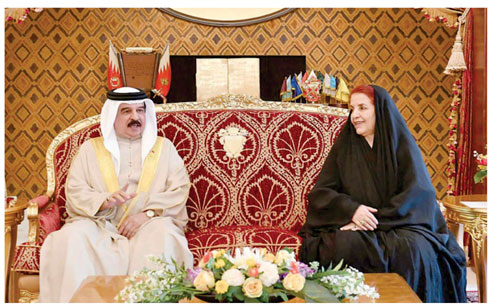In its fourteenth year, the Bahraini Women’s Day (BWD) in December 2022 continues to celebrate the valued contributions of Bahraini women in all sectors. The theme of BWD this year, “Read, learnt, participated” offers a comprehensive perspective of the milestones achieved by Bahraini women. It tracks back their steady progress in the Kingdom of Bahrain under the leadership of His Majesty King Hamad bin Isa Al Khalifa, to their solid, early beginnings. This year’s celebration coincides with a higher momentum of progress for Bahraini women. The number of female ministers in the cabinet, led by His Royal Highness Prince Salman bin Hamad Al Khalifa, the Crown Prince and Prime Minister, increased from one to five this year.
In the legislative body, the number of women in the Council of Representatives has increased by 33.33%. The highest number of women candidates was also recorded in this year’s elections, with a 50% increase from previous years. In the Shura Council women make up 25% of the total number of members. Bahraini women have always had a pivotal role in the Bahraini society, which increased with the beginning of formal education for girls in 1928, predating the discovery of the first oil well.
Many celebrated women pioneers had broken the glass ceiling gradually and this inexorable forward-looking movement continues to build on and reinforce past achievements with confident steps.
Under the leadership of HM the King, Bahraini women have received tremendous support to fulfill their potential and gain more rights.
The National Action Charter, the Constitution and the establishment of the Supreme Council for Women (SCW), led by its President Her Royal Highness Princess Sabeeka bint Ibrahim Al Khalifa, Wife of HM the King, and the Bahrain Economic Vision 2030, were all milestones that have given a boost to the status of women in the Kingdom.
The SCW has been responsible for overseeing the implementation of women’s political, social, and economic empowerment and advancement policies and promoting the application of the principles of gender equality and opportunity equity.
Its initiatives included the 2013-2022 National Plan for the Advancement of Bahraini Women, which has resulted in achieving results on a nation-wide scale.
The efforts of HRH Princess Sabeeka in the advancement of Bahraini women, have received international recognition, last of which was in March 2022.
HRH’s was listed in the Contemporary and Historical Women Leadership Initiative announced by the delegation of the European Union to the United Nations and the Permanent Mission of Gabon on the occasion of UNESCO’s launch of the International Day of Women in Multilateralism.
The numbers speak for themselves, in a testimonial of the efforts led by HRH which promoted the role of Bahraini women in national development.
An SCW report gauging the progress over the last 10 years found that the percentage of women in the overall working force increased to 43% from 32% in 2012.
The percentage of women in the public sector reached 54% in the second quarter of 2022, with a 7% increase from 2012.
In specialized jobs in the public sector, women make up 59%. Forty seven per cent of executive positions in the government are held by women.
In the private sector, women are 35% of the working force, an increase of 5% from 2012. In the judicial sector, women are 12%, while 33% of Bahraini diplomats are women.
According to the report, the number of female owners of commercial registrations (CR) increased from 39% in 2012 to 43% in 2021.
The percentage of sustainable ownership of CRs for more than five years, increased for women from 34% in 2014 to 38% in 2021. Also, 53% of virtual CRs are owned by women.
Bahrain ranked third globally in the World Competitiveness Yearbook (WCY) published by International Institute for Management Development (IMD), in its index for the share of women in management positions and share of women with degrees.
The Kingdom ranked among the top 10 countries globally in 56 indicators in different areas, including skills of the labor force, gender equality and safety and social harmony.
In the World Bank’s Women, Business and Law 2022 report, Bahrain’s score improved by 73% between 2018 and 2022. It ranked third on a Gulf scale and fifth in the Arab World.
Meanwhile, Bahrain ranked 131 in the Gender Gap Report issued by the World Economic Forum, with the gap settling at 63%. It scored the highest global ranking in high school and higher education.
Socially, the National Plan for the Advancement of women prioritized overall family stability. It continued to cooperate with the executive, legislative and judicial authorities to provide a safe legal framework for women as part of the family law.
As part of those efforts, Family Courts were moved to separate premises providing more privacy for families during proceedings and counselling. SCW also launched a national strategy for the protection of women from domestic violence, as part of the national plan. In 2021, the number of active civil society organizations promoting women’s rights has increased to reach 20.










